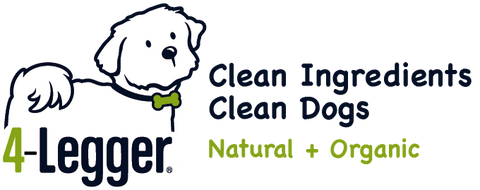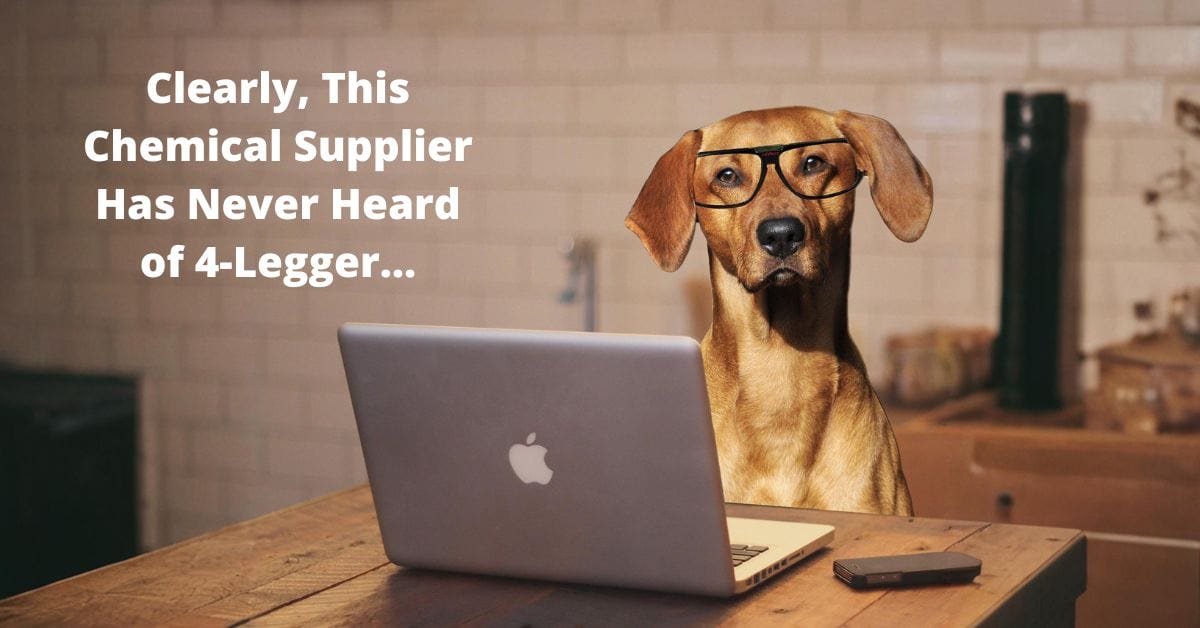Clearly, This Chemical Supplier Has Never Heard of 4-Legger…
Why We Never Use Cocamidopropyl Betaine in our Natural Dog Shampoo
We recently received a pitch from a chemical company trying to sell us something called Cocamidopropyl Betaine (CAB 35%) with the promise that it would "elevate our all natural dog shampoo formulations while reducing expenses."
As we say in the south, "Well bless their little hearts."
We can't help but chuckle.
Because if they really knew who we are, or what 4-Legger stands for, they'd know we'd rather bathe in a mud puddle than put this synthetic ingredient in our products. And we certainly wouldn't put it on your dog.
But in the spirit of education (and transparency), let's break down exactly what CAB 35% is, how it's made, and why it's a firm "no thank you" from us.
So, What Is Cocamidopropyl Betaine?
Cocamidopropyl Betaine (often shortened to CAB or CAPB) is a synthetic surfactant commonly used in shampoos, body washes, facial cleansers, and of course, dog grooming products (yes even all products marketed as all natural dog shampoo may contain CAB).
It's classified as an amphoteric surfactant, meaning it can act as both a positive and negative ion depending on the pH of the solution. That makes it versatile-but versatility isn't the same thing as safety or integrity.
The "coca-" in Cocamidopropyl comes from coconut oil, but don't let that fool you into thinking this ingredient is "natural." It is also referred to as “coconut-based; coconut-derived; plant-based; and shortened to Coco-Betaine.”
The rest of the name - and the process - tells a much different story.
How Is Cocamidopropyl Betaine Made?
It starts off okay: coconut oil is broken down to produce fatty acids, primarily lauric acid.
But here's where it takes a turn. Those fatty acids are chemically reacted with dimethylaminopropylamine (DMAPA) and monochloroacetic acid in a multi-step synthetic process that results in a final surfactant-Cocamidopropyl Betaine.
This process can leave behind contaminants and byproducts that are often not cleaned out of the final product (especially if you want a low cost ingredient), including:
-
Nitrosamines, known carcinogens
-
Amidoamine and DMAPA, which can cause skin irritation and allergic reactions
That's right. Even in "gentle" formulations, these byproducts have been linked to contact dermatitis - especially for sensitive skin, like your dog's.
Why Nitrosamines Matter
Nitrosamines are known carcinogens that can form during the manufacturing of Cocamidopropyl Betaine. They don't just wash away. They can be absorbed through the skin, build up in the body over time, and increase the risk of cancer with prolonged exposure. Even in small amounts, repeated contact raises red flags, especially for our four-legged family members who groom themselves (ingest) and absorb even more through their skin!
What Does "CAB 35%" Mean?
That percentage refers to the active concentration of Cocamidopropyl Betaine in the solution. In this case, it's 35% active, meaning the other 65% is typically water and possibly preservatives or stabilizers.
For formulators trying to save money and bulk up foam, that 35% active CAB might look like a bargain.
But 4-Legger is not, has not, and never will be in the business of cheap shortcuts.
Why 4-Legger Would Never Use CAB in our All Natural Dog Shampoo
At 4-Legger, we have one simple rule: if we wouldn't use it on ourselves (or our own dogs), we won't use it in anything we make.
Here's why CAB doesn't make the cut:
-
❌ Synthetic and petroleum-derived ingredients are not part of our mission.
-
❌ Potential skin irritants don't belong on your dog's body.
-
❌ Foam for the sake of foam isn't worth sacrificing safety or integrity.
-
❌ Can't be used in organic products all 4-Legger shampoos are USDA certified to organic standards. This ingredient doesn't make the cut for 4-Legger organic dog shampoo standards! And be sure you understand that if a shampoo claims to be organic and yet uses cocomidapropyl betaine, it is NOT an organic product.
-
✅ We use true, organic, and sustainably sourced ingredients that actually clean your dog without compromising your pet's health, your health or the planet.
Bottom Line: Every Dog Deserves Better
We know there are many brands out there cutting corners to save a buck and calling it "natural dog shampoo." Even most of the more popular brands. But not us. Our mission is to set the standard - not lower it.
So thank you, kind chemical supplier, but we'll pass on your toxic chemical.
And to our customers: thank you for expecting more. We promise to keep delivering it.





